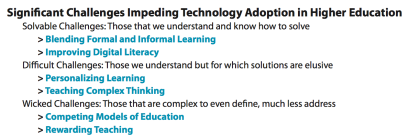The first week’s readings cover a wide range of topics at a view from 30,000 feet. At first I thought I would have a hard time taking a clear angle on my first blog post.
 Then I read the NMC Horizon Report for 2015. I immediately balked at the table of contents: what kinds of conclusions can this study possibly make when something as critically important as “competing models of education” gets thrown in as a bullet point under “wicked challenges?” Why should any other bullet point in that list matter if something as foundational as the model and purpose of education itself* is up for grabs? I decided on my format: tirade.
Then I read the NMC Horizon Report for 2015. I immediately balked at the table of contents: what kinds of conclusions can this study possibly make when something as critically important as “competing models of education” gets thrown in as a bullet point under “wicked challenges?” Why should any other bullet point in that list matter if something as foundational as the model and purpose of education itself* is up for grabs? I decided on my format: tirade.
- I have an issue with “learner analytics” and “learner profiling” flowing so naturally throughout this document. What are we thinking? Is the next horizon of education really just about squeezing into more efficient systems? Is that all it is? Are the issues with this being problematized anywhere? For example, who is determining what information gets measured for the sake of this big data? And how is it being quantified? Right away, I think I could spend the whole semester focusing a critical pedagogue’s lens on “learning analytics” and “learner profiling.” I want a more personal education, not a more algorithmically personalized education.
- Classroom spaces are transforming. Apparently that’s a pretty easy change for colleges: larger screens are fostering more collaboration; different room layouts are facilitating more project-based interactions. But wait — what about all of the embedded changes in just these two examples? Both have underlying assumptions about a changing epistemology that the NMC report has no interest in examining. Just the ed-tech. More collaboration might mean that not everyone needs to know everything. Valuing project-based interactions might be an indication that knowing and doing are both important sides of the same coin. And that’s a dramatic change from traditional models of education, which tend to value thinking and knowing and writing and test-taking by independent individuals.
- Blending informal learning and formal learning is a “solvable” challenge. Yeah right. Sure, educational institutions can make room for self-motivated, curiosity-driven explorations here and there, but to blend formal and informal learning is a radical idea. Would the ivory tower ever value informal learning equally? This idea is on a collision course: when education for the sake of learning challenges education for the sake of credentialing. These two do not cleanly align. It is a messy, societal issue on the table here; not a “solvable” ed-tech one. (And it is closely aligned to the challenges related to business models, in my opinion.)
There’s more nuance to discuss here than these few bullet points allow. (And there are other readings that didn’t make the cut of this blog-post-tirade.) But the exercise of articulating these issues helps me keep a more discerning view on education, technology, and ed-tech as separate but overlapping spheres. With so much focus on the way that technology is changing in today’s world, I want to invest my commitment in understanding how learning is fundamentally changing — and not just as a byproduct of changing technology.
* Okay, well it turns out that “models” here is referring as much to business models of institutions of higher education as much as anything else. But the way I (mis)read this did resonate throughout: it was clear the article was interest first in ed-tech, and second in the educational stance that the ed-tech might best serve.